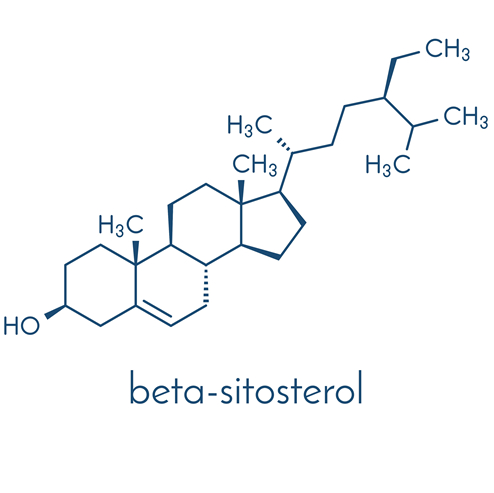
Sitostanol
Alternate names: 24-alpha-ethylcholestanol, Beta-sitostanol, Bêta-sitostanol, Dihydro-beta-sitosterol, Ester de Stanol Végétal, Fucostanol, Phytostanol, Plant Stanol, Plant Stanol Esters, Stanol Végétal, Stigmastanol
Actions: Effects on absorption of fat-soluble nutrients, Lipid-lowering
Background
Sitostanol is a plant product. It is made from vegetable oils or the oil from pine tree wood pulp, and is then combined with canola oil.
Sitostanol is most commonly used for heart disease and high cholesterol.
Sitostanol is an ingredient in Benecol margarine and some salad dressings. The U.S. Food and Drug Administration (FDA) allows manufacturers of products that contain sitostanol to claim that the product lowers the risk of getting heart disease. There is plenty of evidence that sitostanol lowers cholesterol levels, but so far there is no proof that long-term use lowers the risk of developing heart disease.
Sitostanol is most commonly used for heart disease and high cholesterol.
Sitostanol is an ingredient in Benecol margarine and some salad dressings. The U.S. Food and Drug Administration (FDA) allows manufacturers of products that contain sitostanol to claim that the product lowers the risk of getting heart disease. There is plenty of evidence that sitostanol lowers cholesterol levels, but so far there is no proof that long-term use lowers the risk of developing heart disease.
Safety Safety definitions
When taken by mouth: Sitostanol is LIKELY SAFE for most people when taken by mouth. Adults can safely use sitostanol for up to 1 year, and children can safely use it for up to 3 months. Sitostanol might cause stomach upset or too much fat in the stool (steatorrhea).
There is some concern that sitostanol might decrease absorption of some nutrients since it decreases fat absorption. Sitostanol does seem to reduce the absorption of dietary beta-carotene, but this reduction may not be important to health.
There is some concern that sitostanol might decrease absorption of some nutrients since it decreases fat absorption. Sitostanol does seem to reduce the absorption of dietary beta-carotene, but this reduction may not be important to health.
Special Precautions & Warnings:
Pregnancy and breast-feeding: There isn't enough reliable information to know if sitostanol is safe to use when pregnant or breast-feeding. Stay on the safe side and avoid use.Effectiveness
NatMed Pro rates effectiveness based on scientific evidence according to the following scale: Effective, Likely Effective, Possibly Effective, Possibly Ineffective, Likely Ineffective, Ineffective, and Insufficient Evidence to Rate.
Likely effective Effectiveness definitions
- High cholesterol. Sitostanol is effective for reducing cholesterol levels in adults with high cholesterol. It doesn't have to be taken with meals to work. Cholesterol levels decrease within 2 to 3 weeks of starting sitostanol. Sitostanol may not have the same effect in all people. About 12% of people do not respond to sitostanol.
People usually take sitostanol as an ingredient of Benecol margarine. Sitostanol can reduce total and "bad" low-density lipoprotein (LDL) cholesterol levels by 6% to 20%. Most research shows that a dose of about 2-3 grams per day lowers cholesterol the most. Higher doses do not seem to work any better.
Possibly effective Effectiveness definitions
- Inherited tendency towards high cholesterol (familial hypercholesterolemia). Sitostanol is possibly effective for reducing cholesterol levels in children and adults with high cholesterol levels due to familial hypercholesterolemia. Taking sitostanol seems to reduce total cholesterol by 11% to 14% and "bad" low-density lipoprotein (LDL) cholesterol levels by 15% to 33% in people who also take cholesterol-lowering drugs called statins.
Insufficient evidence Effectiveness definitions
- Heart disease.
Dosing & administration
The following doses have been studied in scientific research:
ADULTS
BY MOUTH:
BY MOUTH:
ADULTS
BY MOUTH:
- For high cholesterol: 200 mg to 9 grams of sitostanol has been used daily, but doses of 2-3 grams daily are most common. Doses above 2-3 grams daily may be only slightly more effective. Single daily doses seem to be as effective as divided doses taken twice or three times daily.
- For reducing cholesterol levels in adults with an inherited tendency towards high cholesterol (familial hypercholesterolemia): About 2 grams of sitostanol has been taken daily for up to 3 months.
BY MOUTH:
- For high cholesterol: 1.5 grams of sitostanol has been used daily in children aged 6 years.
- For reducing cholesterol levels in children with an inherited tendency towards high cholesterol (familial hypercholesterolemia): 1.5-6 grams of sitostanol per day have been used in children aged 2-15 years.
Interactions with pharmaceuticals
It is not known if Sitostanol interacts with any medicines. Before taking Sitostanol, talk with your healthcare professional if you take any medications.
Interactions with herbs & supplements
Beta-carotene: Sitostanol can reduce absorption and blood levels of beta-carotene. But this may not be important to health. Taking extra beta-carotene is probably not necessary. If you are worried about this interaction, eat more beta-carotene-rich vegetables.
Interactions with foods
There are no known interactions with foods.
Action
Sitostanol stops the cholesterol from food entering the body.
vital.ly has licensed monographs from TRC Healthcare.
This monograph was last reviewed on 30/03/2023 11:00:00 and last updated on 14/12/2021 08:10:14. Monographs are reviewed and/or updated multiple times per month and at least once per year.
Natural Medicines disclaims any responsibility related to medical consequences of using any medical product. Effort is made to ensure that the information contained in this monograph is accurate at the time it was published. Consumers and medical professionals who consult this monograph are cautioned that any medical or product related decision is the sole responsibility of the consumer and/or the health care professional. A legal License Agreement sets limitations on downloading, storing, or printing content from this Database. No reproduction of this monograph or any content from this Database is permitted without written permission from the publisher. It is unlawful to download, store, or distribute content from this site.




